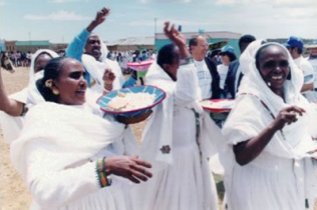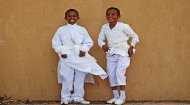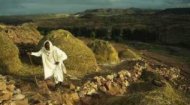Eritrean Culture
Eritrea in Africa has a rich and fascinating history. Its predecessor, the Kingdom of Askum was considered to be one of the four great civilisations together with Rome, Persia and China, however, the rise of Islam saw the kingdom disintegrate and fragment. It formed into an Italian colony in 1889 with aspirations to make it the heart of a Second Roman Empire in Africa, however Italian defeat by British forces there in 1941 during WW2 led it to become under British rule until such time as the Allies could determine its future with a British view that it should be ceded to Ethiopia as a thank-you for support during the war.
 Following independence from Ethiopia in 1993 and the imposition of one party rule under the People's Front for Democracy and Justice (PFDJ), today Eritrea has been described as the North Korea of Africa, reflecting the paranoia and secrecy of the state. Men dominate Eritrean culture with a husband or a father (Abo) being seen as the pillar and the strength of the family. The male is seen to be the provider and educator of his children and protector of his home and family. Whilst this is a tradition in many cultures, as elsewhere, it relegates the role of women and most families would prefer to have male children rather than girls (who are often married at 12 years old) who are afforded less opportunities in general, particularly in education (where learning focuses on the development of domestic skills) and employment. All children in Eritrea are given their father's first name as their surname. There are a number of cultural groups within Eritrea including the Tigrinya, Saho, Kunama, Tigre and Afar, however 80% of the population is either Tigrinya or Tigre, mainly Tigrinya. In essence Eritrea is an Afro-Asian nation. Following independence from Ethiopia in 1993 and the imposition of one party rule under the People's Front for Democracy and Justice (PFDJ), today Eritrea has been described as the North Korea of Africa, reflecting the paranoia and secrecy of the state. Men dominate Eritrean culture with a husband or a father (Abo) being seen as the pillar and the strength of the family. The male is seen to be the provider and educator of his children and protector of his home and family. Whilst this is a tradition in many cultures, as elsewhere, it relegates the role of women and most families would prefer to have male children rather than girls (who are often married at 12 years old) who are afforded less opportunities in general, particularly in education (where learning focuses on the development of domestic skills) and employment. All children in Eritrea are given their father's first name as their surname. There are a number of cultural groups within Eritrea including the Tigrinya, Saho, Kunama, Tigre and Afar, however 80% of the population is either Tigrinya or Tigre, mainly Tigrinya. In essence Eritrea is an Afro-Asian nation.
The flag of Eritrea is comprised of the colours green, representing the country's agriculture, blue for the ocean and red representing the blood shed in the long struggle for independence. The yellow symbol further represents the independence of the nation. Eritrea has nine recognised ethnic groups; the Tigrinya (50%), Tigre (30%), Saho (4%), Afar (4%), Kunama (4%), Bilen (3%), Hedareb/Beja (2%), Nara (2%), and the Rashaida (1%) and its main religions are Eritrean Orthodox, Roman Catholic, Evangelical Lutheran, Sunni Muslim with approximately half of the population being Christian. A small proportion of the population practice indigenous religions.
|

 Following independence from Ethiopia in 1993 and the imposition of one party rule under the People's Front for Democracy and Justice (PFDJ), today Eritrea has been described as the North Korea of Africa, reflecting the paranoia and secrecy of the state. Men dominate Eritrean culture with a husband or a father (Abo) being seen as the pillar and the strength of the family. The male is seen to be the provider and educator of his children and protector of his home and family. Whilst this is a tradition in many cultures, as elsewhere, it relegates the role of women and most families would prefer to have male children rather than girls (who are often married at 12 years old) who are afforded less opportunities in general, particularly in education (where learning focuses on the development of domestic skills) and employment. All children in Eritrea are given their father's first name as their surname. There are a number of cultural groups within Eritrea including the Tigrinya, Saho, Kunama, Tigre and Afar, however 80% of the population is either Tigrinya or Tigre, mainly Tigrinya. In essence Eritrea is an Afro-Asian nation.
Following independence from Ethiopia in 1993 and the imposition of one party rule under the People's Front for Democracy and Justice (PFDJ), today Eritrea has been described as the North Korea of Africa, reflecting the paranoia and secrecy of the state. Men dominate Eritrean culture with a husband or a father (Abo) being seen as the pillar and the strength of the family. The male is seen to be the provider and educator of his children and protector of his home and family. Whilst this is a tradition in many cultures, as elsewhere, it relegates the role of women and most families would prefer to have male children rather than girls (who are often married at 12 years old) who are afforded less opportunities in general, particularly in education (where learning focuses on the development of domestic skills) and employment. All children in Eritrea are given their father's first name as their surname. There are a number of cultural groups within Eritrea including the Tigrinya, Saho, Kunama, Tigre and Afar, however 80% of the population is either Tigrinya or Tigre, mainly Tigrinya. In essence Eritrea is an Afro-Asian nation.







